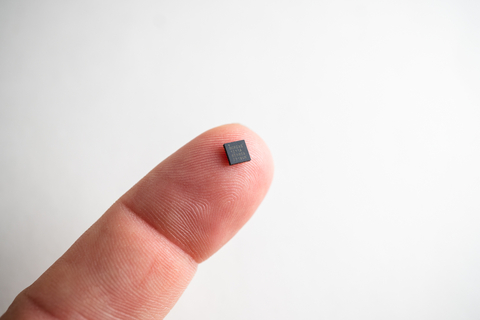Boréas Successfully Completes AEC-Q100 Grade 2 Automotive Qualification for BOS1211 Piezo Haptic Driver
Boréas Successfully Completes AEC-Q100 Grade 2 Automotive Qualification for BOS1211 Piezo Haptic Driver
--Third-generation haptics offer crisp tactile feedback to drivers, enhancing safety
Boréas has successfully completed AEC-Q100 Grade 2 automotive qualification for its BOS1211 piezo haptic driver. The BOS1211 lets automotive OEMs and Tier 1 suppliers add highly responsive, customizable tactile feedback to the buttons and sliders in the car’s central display and steering wheel--enriching touch interactions. (Photo: Business Wire)
BROMONT, Québec--(BUSINESS WIRE)--Boréas Technologies — a pioneer in third-generation, piezo-based haptics for automotive, consumer and mobile applications — has completed AEC-Q100 Grade 2 qualification for the BOS1211, its powerful piezo haptic driver IC designed for the automotive market.
“Piezo haptic buttons in automotive cabins provide the same reassuring tactile feedback as older mechanical buttons in a more sophisticated, versatile user interface," said Simon Chaput, co-founder & CEO, Boréas Technologies
Share
The BOS1211 lets automotive OEMs and Tier 1 suppliers add highly responsive, customizable tactile feedback to the buttons and sliders in the car’s central display and steering wheel — offering much faster response time and localized feedback, as well as extended frequency range — to touch interactions. This is a dramatic improvement over older haptic technologies, such as linear resonant actuators (LRAs), which have much slower startup and ramp-down time as well as a very limited frequency range. Gated by their larger size and inherent performance problems, LRAs deliver a “mushy” feel to the touch because the LRA isn’t localized to the actual button that’s pressed. In contrast, piezo haptic buttons and sliders deliver “crisp” effects that can be customized to mimic the feel of mechanical buttons because they can be located under a specific button.
Reducing Distracted Driving
The BOS1211 capitalizes on the automotive industry’s interest in more sensitive, intuitive tactile experiences. As automotive designers increasingly move routine controls such as shift, drive, park, headlights, wipers, and volume to the car’s central screen or the center of the steering wheel, they’re creating more opportunity for distracted driving by forcing the driver’s eyes off the road. A 2022 Swedish study, for example, tested how long it took a driver to perform four tasks — such as adjusting temperature and volume controls — while driving at 68 mph.i Performing the tasks on the 2005 Volvo V70, the only car without a touchscreen, took just 10 seconds. Executing the same tasks on the MG Marvel R required 44.9 seconds, and the Tesla Model 3 clocked the tasks at 23.5 seconds. See the results.
“Piezo haptic buttons in automotive cabins offer drivers the best of both worlds. Whether embedded in the steering wheel or in the car’s central display, they provide the same reassuring tactile feedback as older mechanical buttons in a more sophisticated, versatile user interface,” said Simon Chaput, founder and president, Boréas Technologies. “They’re also advantageous to designers because they’re a fraction of the size and 10x to 13x more power-efficient than LRAs.”
About the BOS1211
The BOS1211 is a small, but powerful piezo driver IC based on Boréas CapDrive® Technology, a patented, scalable ultra-low-power architecture that promotes responsive localized haptic feedback and integrated force sensing in a wide range of applications. For more information, visit: https://www.boreas.ca/products/bos1211-piezo-haptic-driver
Availability
The BOS1211 is currently available in low-volume quantities from DigiKey: the BOS1211 driver IC and the BOS1211 Premium Development Kit. Please direct high-volume inquiries to Boréas at: https://www.boreas.ca/pages/contact
About Boréas Technologies
Boréas Technologies Inc. is an award-winning fabless semiconductor company commercializing ultra-low-power piezo IC platforms in consumer and industrial markets. With origins in research conducted at Harvard University, Boréas is based in Bromont, Québec and is supported by a global distribution network. The company’s CapDrive ICs are ideal for resource-constrained devices such as PC trackpads, smartwatches and fitness trackers, smartphones and gaming phones, VR game controllers and peripherals, and Internet of Things (IoT) devices. Connect with Boréas on LinkedIn or email: info@boreas.ca.
The Boréas logo and CapDrive are registered trademarks of Boréas Technologies Inc. All other product and company names are trademarks or registered trademarks of their respective holders.
iF. D. Vikström, “Physical buttons outperform touchscreens in new cars, test finds.” ViBilägare, October 18, 2022.
Contacts
Press
Marc-André Morin, Boréas Technologies
Email: mamorin[at]boreas.ca
Maria Vetrano, Vetrano Communications
Email: maria[at]vetrano.com

